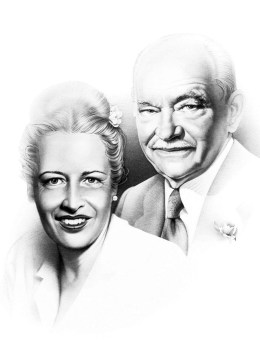 Dr. and Mrs. Robert S. Flinn established the Flinn Foundation in 1965 as a privately endowed grantmaking organization for the improvement of the quality of life in Arizona. Robert Flinn, a cardiologist and one of Arizona’s leading medical practitioners, and Irene Flinn, a woman of considerable wealth and generous philanthropy, created the Foundation as a means to perpetuate their personal goodness and humanity in a way that would benefit the citizens of Arizona.
Dr. and Mrs. Robert S. Flinn established the Flinn Foundation in 1965 as a privately endowed grantmaking organization for the improvement of the quality of life in Arizona. Robert Flinn, a cardiologist and one of Arizona’s leading medical practitioners, and Irene Flinn, a woman of considerable wealth and generous philanthropy, created the Foundation as a means to perpetuate their personal goodness and humanity in a way that would benefit the citizens of Arizona.
Robert Flinn and his father, Dr. John Flinn, who ran a well-known tuberculosis sanatorium in Prescott in the early 1900s, each practiced medicine for roughly 50 years in Arizona.
Robert Flinn headed the departments of cardiology and electrocardiography at St. Joseph’s Hospital in Phoenix. He was chief of the medical staff at St. Joseph’s and at Phoenix Memorial Hospital, president of both state and county medical societies, and co-founder and first president of the Arizona affiliate of the American Heart Association. Dr. Flinn died in 1984 at age 87; Mrs. Flinn in 1978 at age 78.
It came as no surprise that the Flinns chose to focus their grantmaking primarily on improving the quality of health care in Arizona. Grants initially focused on advancing medical education and biomedical research, and later broadened to support efforts in community health care and studies of health-policy issues.
In the mid-1980s, the Foundation expanded its focus to include programs beyond health care, including the Flinn Scholars Program and the arts.
In 2001, after an exhaustive review of Arizona’s health care needs, the Foundation board and staff decided to narrow its grant making focus in this field, in order to have a greater impact in one key area: the advancement of the biosciences in Arizona.
The Foundation launched the Arizona Center for Civic Leadership in 2011 to help ensure strong future leadership for Arizona. The flagship Flinn-Brown Fellowship, co-sponsored by the Thomas R. Brown Foundations, identifies and develops Arizonans who want to serve at the state level.
The Foundation’s philanthropic activities intersect wherever possible, a recognition of the importance of ecosystem thinking.